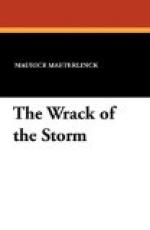The time has come to end this foolery! The time has come for everything that draws breath to rise up against these systematic, insane and stupid acts of destruction, perpetrated without any military excuse or strategic object. The reason why we are at last uttering a great cry of distress, we who are above all a silent people, the reason why we turn to your mighty and noble country is that Italy is to-day the only European power that is still in a position to stop the unchained brute on the brink of his crime. You are ready. You have but to stretch out a hand to save us. We have not come to beg for our lives: these no longer count with us and we have already offered them up. But, in the name of the last beautiful things that the barbarians have left us, we come with our prayers to the land of all beautiful things. It must not be, it shall not be that, on the day when at last we return, not to our homes, for most of these are destroyed, but to our native soil, that soil is so laid waste as to have become an unrecognizable desert. You know better than any others what memories mean, what masterpieces mean to a nation, for your country is covered with memories and masterpieces. It is also the land of justice and the cradle of the law, which is simply justice that has taken cognizance of itself. On this account, Italy owes us justice. And she owes it to herself to put a stop to the greatest iniquity in the annals of history, for not to put a stop to it when one has the power is almost tantamount to taking part in it. It is for Italy as much as for France that we have suffered. She is the source, she is the very mother of the ideal for which we have fought and for which the last of our soldiers are still fighting in the last of our trenches.
FOOTNOTES:
[Footnote 2: Delivered at the Scala Theatre, Milan, 30 November, 1914.]
* * * * *
HEROISM
VI
HEROISM
1
One of the consoling surprises of this war is the unlooked-for and, so to speak, universal heroism which it has revealed among all the nations taking part in it.
We were rather inclined to believe that courage, physical and moral fortitude, self-denial, stoicism, the renunciation of every sort of comfort, the faculty of self-sacrifice and the power of facing death belonged only to the more primitive, the less happy, the less intelligent nations, to the nations least capable of reasoning, of appreciating danger and of picturing in their imagination the dreadful abyss that separates this life from the life unknown. We were even almost persuaded that war would one day cease for lack of soldiers, that is to say, of men foolish enough or unhappy enough to risk the only absolute realities—health, physical comfort, an unimpaired body and, above all, life, the greatest of earthly possessions—for the sake of an ideal which, like all ideals, is more or less invisible.




